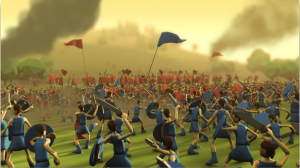One element that crowd funding has certainly affected was opening up the design process of games to the consumer and allowing them to see Beta or even Alpha stage design. And that has translated into Steam now allowing users to buy into the Alpha of games thanks to its early access program.
But as more games are being released to compete for your dollars, a debate is going on with how we should treat games that still need a lot more time in the oven.
Product Testing:
One of the biggest mistakes when it comes to consumer products is letting the consumer see the untested version of your product. Millions of dollars are spent on advertising with the sole purpose to show a product in its very best light. As that first viewing or use of a product will determine the consumer’s perception of the product; there are rarely do-overs.
And with video games, that standard held true for a long time. If you weren’t a member of the development team, you would never see a game in its Beta form, much less its Alpha. Only a rare few could see a game like that and you had to earn that privilege.
I remember my first real exposure to game development came from being accepted into Shrapnel Games’ Beta testing program in the 00s and back then it was a privilege. I got to talk to the developers, found game crippling bugs and got my name in the credits. Being a beta tester was the closest you could have come at the time to seeing the raw version of the game.
But crowd-funding brought the consumer and the designer closer than ever before and gave fans unprecedented access to the development of a game. When I spoke with Chris Hecker on the cast last week, he talked about how vital crowd-funding and alpha testing was not only for financial reasons, but for improving his game.
Minecraft was arguably the first game to really take off thanks to crowd-funding and the number of people who paid into the Alpha of the game gave Notch enough money to focus exclusively on game development.
And speaking with Chris Park from Arcen Games, he talked about the help they’ve had from their hardcore fans Alpha and Beta testing their games. And their games are more refined thanks to their fans either catching bugs or making suggestions that the dev team implements.

Planetary Annihilation’s alpha and beta pricing were meant to include the kickstarter rewards and dissuade people who were only interested in a finished product.
Today with crowd-funding and Steam’s early access program, what was once an exclusive option is now being offered to those with enough cash.
Now, there are two questions to this debate: Should developers be allowed to sell early versions of their games? And, how do you treat an early access game in terms of reviews or critiquing?
The problem with early access games for the journalistic community is that they present another version of a game to look at. Normally, reviewers will either see special preview or press copies of a game, or the review build of the game that is going to be sold in stores. The former were options not available for purchase while the latter was.
But now, we’re seeing even earlier versions of games being made available but costing just as much, if not more than the retail version. And many times, these versions of the game show the game in the worse possible light. From bugs, compatibility issues and even entire mechanics and systems simply not working or there. In fact, people are buying into Alphas of games where the game may still require years of development before it is considered done.
Many people are not fans of developers outright selling access to their games like this. They feel like with other consumer products, that the company should only be asking money for the final product. You don’t go to a car dealership, buy a car and then wait for it to be built. And for stores like Steam to advertise Alpha state games on the front page, they feel that space should only be for completed games.
And to make things worse, we have seen several cases of developers abusing early-access or crowd funding in several ways. From taking the money and run, to releasing a product that did not meet the goals or promises by the developer. There was the whole debacle around the War Z: circumventing green light to release what was very much an alpha build game, but saying that it was a full release.
As we’ve talked about, ownership and spending money are a big deal to the consumer’s perception of a product. And as more and more games are being released at Alpha state, reviewers are taking notice. Eurogamer recently announced that they will start reviewing Alphas and Betas of games, but without any score attached.
Personally, I’m not a huge fan of paying and playing Alpha state games as I already have a big enough backlog as it is. But I see no reason to ban them or to make a fuss of reviewing them for one simple fact: No one is forcing you to buy them.
Pay Time:
Any games marketed as Alpha or Beta builds means just that — They’re not ready for the general consumer yet. Buying a game on early-access or from the developer is essentially preordering a game, but now you can play it throughout development instead of on the release date or a few hours before.
When a developer goes out of their way to say that “the game is not done, don’t buy it if you don’t want to see any bugs”, then in my opinion, anyone who buys the game waives the right to just complain about issues or the state of the game.

Games on Steam’s early access, are put on at different stages of completion. Such as Godus which was only about 40 percent done.
Some developers have taken extra steps to curtail people from buying into their Alphas by charging more money now.
Such as Planetary Annihilation and Prison Architect, whose Alphas cost $90 and $30 respectively. The Prison Architect developers said that the reason was to make sure that only the people interested in the development of the game would buy it and save the reduce price for when the game is ready for the general consumer.
This is also why I find the idea of creating special reviews just for Alpha and Beta builds of games to be superfluous. First is the fact that every Alpha build game is different in terms of development strategy and updates.
Kerbal Space Program can go months before a new build while Introversion with Prison Architect aim for one build each month. This means that there is no standard for what an Alpha of a game should look like. As Chris Hecker said on the cast about crowd funding:” it’s really like the Wild West.” There are no rules for what an Alpha of a game should be like and to try and create a “review” for one instead of a preview doesn’t make sense to me.
Another issue is that it just adds to the confusion for the consumer when you start “reviewing” multiple builds of a single game. That raises another question: How far should an Alpha go before you re-review it? Do you wait for each major milestone, a new build, five new builds or what?
Again, there are no rules to define the progress of an Alpha build game, making each one a different matter. As we’ve talked about on the cast, crowd-funding and early access are still new concepts to the general consumer.
This is another one of those times where I’m glad that I don’t have to deal with review scores and I’m fine to preview Alpha builds and review a game when it’s done.
Crowd funding has certainly turned game development on its head and while the designers I’ve spoken to have different feelings on both matters, they do agree on one point. That the true measure of whether these models can be sustainable or not falls upon the games that have already had successes. If the consumer confidence drops due to failed game projects, it will reduce the # of crowd funded successes and may render this debate moot.
But until that happens, we can expect gamers on both sides to keep the debate alive.



Pingback: An Early Access Rebuttal | Game Wisdom()